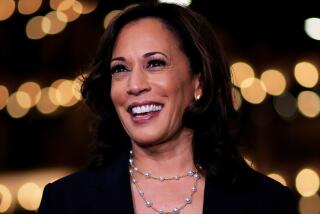Clinton Denies Altering Ethics Law to Exempt Himself : Democrats: He is angered by that assertion in a press report, and frustrated generally at tone of media coverage.
- Share via
The events Friday were vintage Bill Clinton. First, he issued an impassioned plea for racial and ethnic harmony at the Jewish Museum of the New York Historical Society. Then, he flew halfway across the country to offer a statistics-laden policy speech before the Wisconsin Legislature.
But in what has become a painful ritual for a campaign now accustomed to regular investigative reports in the press, Clinton began the day with a news conference where he emphatically denied a story in Friday’s New York Times. The story asserted that Clinton had altered an Arkansas ethics law to exempt himself from requirements imposed on the Legislature.
The charge infuriated Clinton because passing an ethics law in a state where there was none had been one of his personal crusades. Clinton insisted that changes were made in the law solely to simplify it after the Legislature had rejected it, and to make it easier to win voter approval in a referendum.
“If the import of the story is that there was some effort by me to reduce my coverage under the ethics laws, that’s just not true,” Clinton said at a New York news conference.
“I created the commission (that wrote the law), I called the legislative session, I tried to pass the bill the way it was,” he said, referring to the earlier proposal that would have fully covered the governor. “When it didn’t pass, we decided to go to the people and there was a consensus decision that the bill should be simplified to increase its chances of passage.”
Although he answered questions calmly, Clinton has been under pressure since his loss to former California governor Edmund G. (Jerry) Brown Jr. in Tuesday’s Connecticut primary. Clinton campaign polls have shown him and Brown nearly even in New York, making it imperative for Clinton to focus his campaign on attacks against Brown and on making himself the candidate of change and reform.
But in the wake of the Connecticut results, Clinton has become increasingly open in expressing his frustrations with the tone of the steady stream of press inquiries into his past and his record as governor.
He spoke of his anger in an interview earlier this week and his fury exploded publicly Thursday night when he responded to an AIDS activist who spoke sarcastically of Clinton’s ambition at a New York City fund-raiser. Clinton spoke of “all this crap I’ve put up with” and of “attacks, attacks, attacks on me.”
Clinton’s staff said his remarks on the press reflected feelings he had been expressing in private for some time.
George Stephanopoulos, Clinton’s deputy campaign manager, said Clinton’s response to the questioner from the ACT-UP organization was conditioned by the candidate’s openness to AIDS demonstrators throughout the campaign, an openness that he felt went unrequited Thursday night.
“For two months, at almost every single event he’s been at, he’s been met by a group of ACT-UP people,” Stephanopoulos said. “At every event, he walks up and talks to them and takes their questions publicly.”
Clinton’s campaign wants to find ways of publicly questioning whether the scrutiny of Clinton has been fair, and whether it has been disproportionate with the scrutiny given to Brown or President Bush.
But aides say that Clinton himself cannot afford to make too much of a public issue of media coverage, since his main objective now must be to defeat Brown and concentrate public attention on his own message.
Toward that end, the campaign’s hectic day ended in Indiana, where he was endorsed by Gov. Evan Bayh. Clinton released two new advertisements--one about his personal accomplishments, the other an attack on Brown’s “flat-tax” proposal--and produced a packet of documents in an effort to rebut the New York Times story.
According to those documents and recent interviews in Arkansas with those who helped draft the legislation, the original bill submitted by the special commission Clinton appointed in 1987 would have required public officials from the governor to county library board commissioners to disclose if they or their families would derive either financial benefit or harm from a decision that fell within their duties and to recuse themselves from that decision.
Clinton supported the proposal and called a special session of the Legislature to consider it. The Arkansas House passed it in February, 1988, but it ran into serious opposition in the Senate and the special session adjourned with no action.
A group of commission members and Clinton aides gathered to draft a new proposal to present to voters on the upcoming November ballot. One key member of both the commission and the new group was Webster Hubbell, head of the Rose Law Firm in Little Rock, Ark., where Hillary Clinton is a partner.
The proposed law they came up with required state legislators to disclose conflicts of interest, but it did not cover local officials and other state officials, including the governor. Voters approved the ballot initiative in November.
Hubbell said, “What we were trying to do is make it simple enough to get it passed.”
Ark Monroe III, another Little Rock lawyer, said he remembers sitting down with Hubbell at a typewriter to draft the new proposal, but he doesn’t recall why state officials other than state legislators were omitted from the conflict of interest requirements.
“I think we were primarily trying to remove the confusion,” he said. “We wanted to make it as clear as possible. . . . I just can’t even believe the controversy. Clinton really went out on a limb.”
The Race for the White House
Here is the delegate tally to date, according to the Associated Press. Tsongas’ delegates are committed to him until the convention, at which time they become available to other candidates. Democrats (2,145 needed for nomination): Bill Clinton: 987 Paul E. Tsongas: 439 Jerry Brown: 150 Uncommitted: 415
Republicans (1,105 needed for nomination): George Bush: 750 Patrick Buchanan: 46 Uncommitted: 6
Contests to Come
Here are the remaining primaries and caucuses: Delegates
March 28 Virgin Islands Caucus Dem. 3 -- March 31 Vermont Caucus Dem. 14 GOP 19 April 2 Alaska Caucus Dem. 13 -- April 5 Puerto Rico Primary Dem. 51 GOP 14 April 7 New York Primary Dem. 244 GOP 100 Wisconsin Primary Dem. 82 GOP 35 Kansas Primary Dem. 36 GOP 30 Minnesota Primary -- GOP 32 April 11 Virginia Caucus Dem. 78 GOP 55 April 18 Alaska Caucus -- GOP 19 April 27 Utah Caucus -- GOP 27 April 28 Pennsylvania Primary Dem. 169 GOP 91 Virgin Islands Caucus -- GOP 4 May 3 Guam Caucus Dem. 3 GOP 4 May 5 D.C. Primary Dem. 17 GOP 14 Indiana Primary Dem. 77 GOP 51 North Carolina Primary Dem. 84 GOP 57 May 9 Delaware Caucus GOP 19 May 12 Nebraska Primary Dem. 25 GOP 24 West Virginia Primary Dem. 31 GOP 18 May 16 Missouri Caucus -- GOP 47 May 19 Oregon Primary Dem. 47 GOP 23 Washington Primary -- GOP 35 May 26 Arkansas Primary Dem. 36 GOP 27 Kentucky Primary Dem. 52 GOP 35 Idaho Primary -- GOP 22 June 2 Alabama Primary Dem. 55 GOP 38 California Primary Dem. 348 GOP 201 Montana Primary Dem. 16 GOP 20 New Jersey Primary Dem. 105 GOP 60 New Mexico Primary Dem. 25 GOP 25 Ohio Primary Dem. 151 GOP 83 June 9 North Dakota Primary -- GOP 17
The Conventions
Democrats: July 13-16
Republicans: Aug. 17-20
More to Read
Get the L.A. Times Politics newsletter
Deeply reported insights into legislation, politics and policy from Sacramento, Washington and beyond. In your inbox twice per week.
You may occasionally receive promotional content from the Los Angeles Times.










